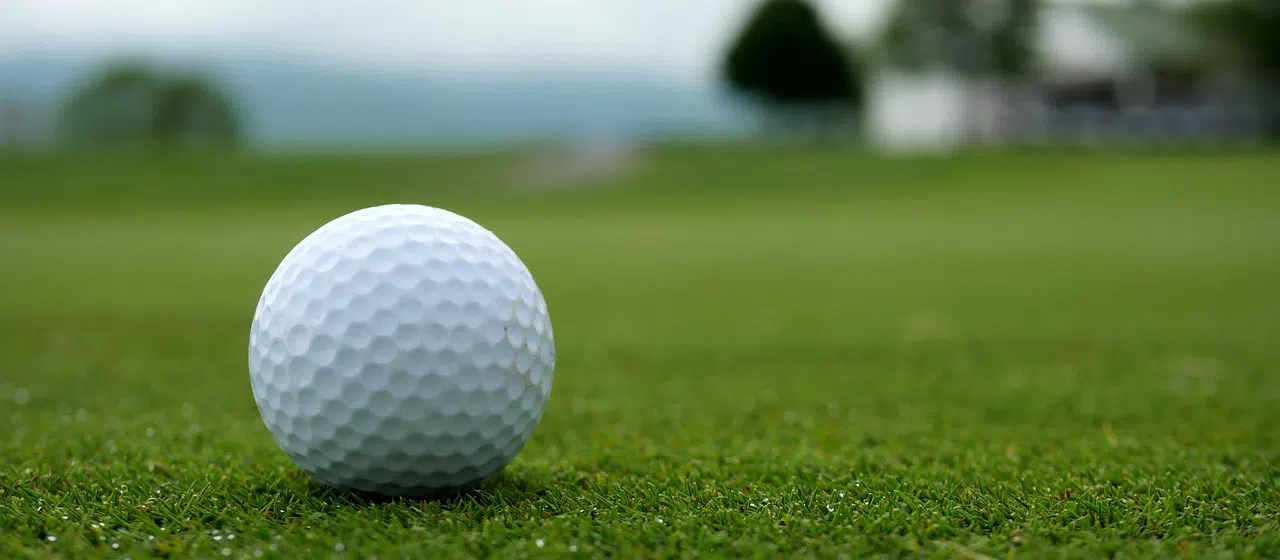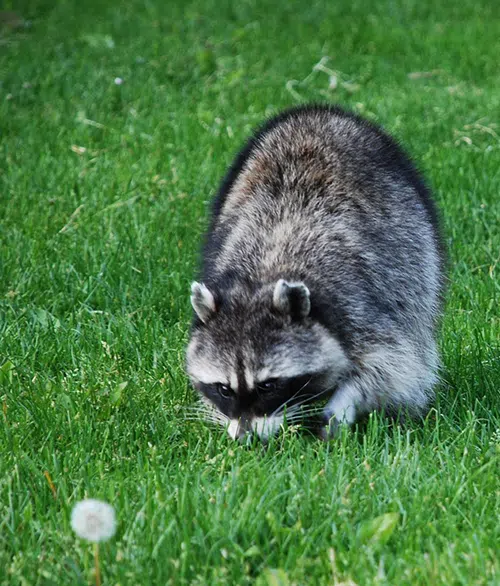The golf course is a wonderful place to enjoy and relax - unfortunately, raccoons agree. Especially when we freely offer access to water, shelter, and often food as well. What's not to love?

If you manage a golf course in the GTA you won't be terribly pleased with the damages to turf, sand bunkers, and the overall landscaping destruction in the wake of a raccoon invasion. Your best option will be to seek the expertise of a wildlife professional for humane long-term raccoon removal solutions.
Why Do Raccoons Target Golf Courses?
Raccoons are intelligent and adventurous night dwellers. A well-designed and well-maintained golf course checks all the boxes for an animal that prefers a quick and easy meal and plenty of ready-made shelter opportunity.
-
Abundant Food Sources: Golf courses offer grubs, worms, garbage bins, and outdoor dining areas.
-
Shelter Opportunities: Clubhouse attics, maintenance sheds, underground drainage, and nearby wood offer perfect shelter and den space.
-
Water Sources: Ponds, lakes, fountains and irrigation systems can easily be used and exploited by raccoons.
-
Low Nighttime Activity: Raccoons thrive at night when golf courses are empty.
Common Entry Points Raccoons Use in Golf Courses
Identifying where exactly raccoons enter the golf course and which routes they travel will help plan effective exclusion strategies. Here are some areas to be aware of:
-
Structural: Clubhouse attics, roof vents, crawl spaces, and maintenance sheds are accessed by exploiting structually weak points in the roof or facade. It's quite amazing how small an opening can allow a raccoon to enter a building.
-
Ground-Level: Storm drains, culverts, and irrigation systems are popular hangouts and access points for raccoons.
-
Natural Cover: Tree lines, the wooded edges of fairways, and tall shrubs near ponds provide perfect cover.
Common Signs of Raccoon Activity on Golf Courses
If raccoons have already invaded your golf course, there’ll be signs:
-
Torn-up sod and turf patches from digging for grubs;
-
Overturned trash bins from and food scraps or garbage scattered near clubhouses;
-
Paw prints and droppings near water hazards or sand traps;
-
Shredded insulation, exposed wiring, or rripped open oof vents.
Any of the above signs must not be ignored. Now is the time to intervene to minimize long-term damages.
Risks of Ignoring Raccoon Infestations in Golf Courses
If you ignore the presence of raccoons on the golf course or in clubhouse areas, you’ll face several risks:
-
Turf Management Costs: Replacing or repairing grass repeatedly.
-
Health & Safety Risks: Rabies, leptospirosis, or roundworm that is present in raccoon droppings.
-
Liability Issues: Club members, guests, or staff encountering aggressive raccoons if wandering too close to a den with raccoon kits.
-
Attraction of Other Wildlife: Open trash areas are attractive to skunks and foxes as well. The presence of raccoons may also invite larger predators like coyotes.
What if Golfers Encounter a Raccoon on the Course?
If golfers encounter a raccoon on the course, here’s what they should do:
-
Stay calm and do not approach.
-
Avoid offering food or trying to scare it away aggressively.
-
Alert staff immediately so the sighting can be documented.
-
If the raccoon appears sick, injured, or unusually bold (possible rabies), golfers should keep distance and call for staff support right away.
Raccoon Safety Measures for Staff Members
Golf course staff members should always take precautions when dealing with raccoons and their aftermath:
- Always wear gloves and protective gear when cleaning areas with raccoon droppings.
- Use proper disinfectants to reduce parasite and bacteria risks.
- Never attempt bare-handed raccoon trapping or handling.
- Train maintenance crews to recognize signs of raccoon latrines, which carry high health risks.
- Establish a reporting protocol for raccoon sightings or damage.
How to Get Rid of Raccoons on Golf Courses
Because the environment of a golf course offers so many advantages to wildlife and cannot be altered, raccoon removal is the only way to get rid off raccoons. But, once the raccoons are removed, it is important to then work on making the environment less inviting for other animals.
Conduct a Professional Site Assessment
Bringing in a professional wildlife control team is the best way to evaluate the problem. It's important to evaluate turf areas, water sources, garbage management, and structural entry points to see where raccoons might be gaining access and what might need to be modified. Also, installing and using tracking and motion cameras can give you and the professionals you hire a better picture of what’s happening on the property at night in terms of raccoon behaviour.
Habitat Modification
Again, there's not a whole lot of landscape modification that wouldn't also take away from the purpose and enjoyment of a golf course. However, you should consider removing easily accessible food sources such as trash bins, or securing them with tight-fitting lids (you can even use bungee cords). You should also take steps to reduce natural food sources - consider eco-friendly turf treatments to address grub infestations.
Humane Removal Methods
When dealing with a raccoon problem on the golf course, trapping and relocation is generally the go-to method. However, the law only allows release of trapped wildlife within one kilometre of the capture site. The drawback of this is that raccoons will literally turn around and come right back. They have excellent homing instincts and regard the golf course as home.
Permanent raccoon removal entails the humane trapping of offending raccoons and licensed euthanasia. This is the only solution with a guarantee that the animal won't return.
Techniques for Raccoon Exclusion on Golf Courses
It’s crucial to not only remove raccoons from buildings and other structures around the golf course, but also to take steps to prevent them from getting back in:
- Install one-way exclusion doors for raccoons already inside structures.
- After the raccoons are removed, seal all structural deficits in maintenance sheds, vents, and crawl spaces.
Raccoon Deterrent Systems
There are some systems suggested to deter raccoons from frequenting the property, but these are mostly ineffective.
-
For example, motion-activated sprinklers or lights to discourage raccoons at night may work for a couple of days but raccoons are intelligent and learn to ignore them quickly.
-
Ultrasonic deterrents will also be ignored once raccoons realize that there is no physical threat.
-
Guard dogs might be effective at first, but they would have to patrol the golf course throughout the night. We’ll explore this option further below.
 Protecting Golf Course Ponds from Raccoons
Protecting Golf Course Ponds from Raccoons
Raccoons are attracted to ponds for water and aquatic life. They may contaminate water with droppings, which can affect irrigation systems and pose significant health risks.
Pro Tips:
-
Reduce food attractants near pond edges (don’t let garbage or food waste accumulate).
-
Regularly test pond water for contamination if raccoons are active nearby.
Can Golf Courses Keep Trained Dogs to Scare Away Raccoons?
Some golf courses already employ trained dogs (commonly border collies or shepherd breeds) to manage geese, and a similar strategy can be considered for raccoons. This raccoon deterrent option has both benefits and limitations.
Benefits:
- Dogs act as a natural predator presence, discouraging raccoons from returning.
-
They can patrol turf areas at night when raccoon activity is highest.
-
Dogs can provides a humane, non-lethal method of control.
Limitations:
-
Professional training is required so that the dogs don’t harm wildlife but rather only scare them off
-
Canine night patrols need dedicated handlers or staff — not a “set and forget” method.
-
Because of the size of golf courses, you'll need a good number of dogs to make the area seem less appealing overall to pesky critters
-
Dogs may be less effective against raccoons that are highly habituated to human activity.
Best Practices:
If a golf course wants to employ this deterrent option effectively, there are some best practices to follow:
-
Use trained dogs as part of an integrated control program (not as the only solution).
-
Combine this strategy with exclusion, turf grub treatment, and secure waste management.
-
Always consider animal welfare and staff safety when implementing.
Long-Term Raccoon Control & Turf Protection
Dealing with raccoons on a golf course isn’t a one-and-one situation. You have to take measures to protect your turf and facilities for the longer term.
- Ongoing Grub Control and Turf Treatment
Eco-friendly grub control and turf treatments can be achieved by applying beneficial nematodes, milky spore, or other biological controls like Metarhizium anisopliae and neem oil to healthy turf. This should be done by a professional. - Staff Training
Establish policies for waste disposal practices and reporting early warning signs of raccoon activity. - Education
- Stress the importance of following best practices (e.g., discourage feeding wildlife) to your staff and golf course attendants. As a side note, wildlife feeding is prohibited in nearly all municipalities in Ontario—make sure your members and guests are aware of that.
- Seek Professional Help
Schedule regular wildlife inspections by pest control/wildlife specialists.
Preventing Raccoon Damage in Clubhouses & Maintenance Areas
Raccoons often break into clubhouses, kitchens, attics, and sheds for food and shelter. They can chew wires, damage insulation, and spread disease through droppings.
Pro Tips:
-
Seal vents, chimneys, crawl spaces, and roof gaps with raccoon-proof materials.
-
Store food securely in clubhouses and kitchens (lockable cabinets and containers).
-
Install heavy-duty lids on maintenance shed trash bins (preferably lockable).
-
Set up surveillance (motion cameras) to detect raccoons before infestations grow.
-
Train staff on safe cleanup procedures if raccoon droppings are found indoors.
Emergency Protocols for Aggressive Raccoon Encounters
-
If you suspect a rabid raccoon (an animal that appears lethargic, unbalanced, disoriented or shows unprovoked aggression) call your local animal control immediately. DO NOT APPROACH.
-
If you find yourself in an enclosed space, a raccoon may act aggressively because it feels trapped. Position yourself in a way that allows the animal to leave and clap or stomp. This should make the raccoon retreat.
-
If you are bitten by a raccoon, seek urgent care immediately. A single bite from a rabid raccoon will have catastrophic consequences without medical treatment.
Limitations of Common Raccoon Control for Golf Courses
While there are some strategies a golf course can implement on its own, there are limitations to this approach.
First of all, raccoons are highly intelligent and learn on the fly. They will quickly habituate to static deterrents that don't pose a real threat. Many solutions can prove ineffective. For example, Loud noises and lights may provide a momentary scare, but raccoons will quickly learn that there is no real danger and will return to the area.
Chemical sprays and granules that you might find commercially available often have a limited effective radius and are quickly washed away by rain or irrigation.
Lastly, in addition to the problem of raccoons returning after their release (remember, you can only release within a one-kilometre radius), repeated trapping will result in trap-shy animals that are then next to impossible to capture.
Choose Hawkeye for Permanent Raccoon Removal on Golf Courses
At Hawkeye Bird & Animal Control, we specialize in permanent raccoon removal tailored for large outdoor properties like golf courses. Here’s what we offer:
-
Expert Site Assessments: Our team identifies entry points, turf vulnerabilities, and raccoon travel routes.
-
Humane & Legal Solutions: All methods follow federal and provincial regulations, ensuring safe, humane, and ethical removal.
-
Permanent Exclusion: We don’t just remove raccoons — we help secure structures, seal off drainage access, and modify habitats to prevent their return.
-
Permanent Raccoon Removal: We are the only wildlife agent in the GTA able to offer permanent solutions.
-
Specialized for Golf Courses: From protecting fairways and turf to safeguarding maintenance sheds and clubhouses, we understand the unique challenges golf courses face.
-
24/7 Wildlife Response: Because raccoons are most active at night, our team is available to act when the problem is most urgent.
Professional Golf Course Raccoon Control
Is raccoon prevention for golf courses possible? Not likely. Raccoons target golf courses due to availability of food, water, and shelter and ignoring the problem leads to costly turf and health issues. Professional removal and long-term management are the best solutions.
If you are a golf course manager/owner in the GTA region, contact Hawkeye Bird & Animal Control for a site assessment and find the solutions right for your property.
Our licensed and experienced wildlife technicians are dispatched to areas all across Southern Ontario, including Toronto, Scarborough, Brampton, Vaughan, Markham, Ajax, Pickering, Newmarket, Etobicoke, Oshawa, and Mississauga.














